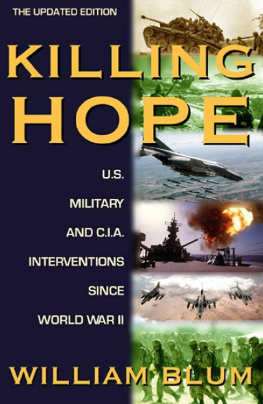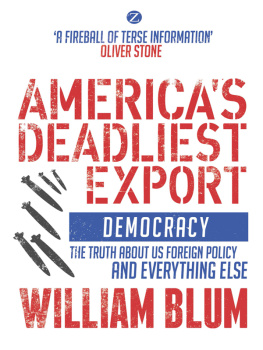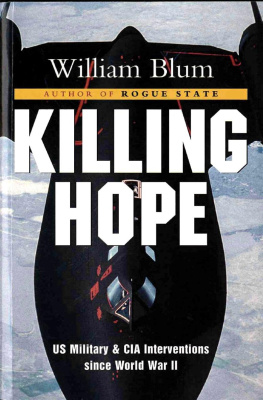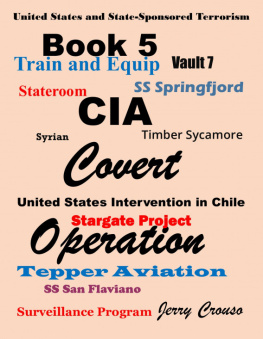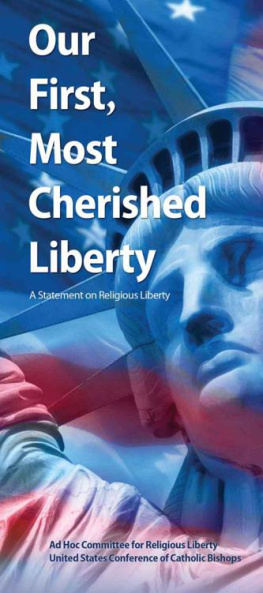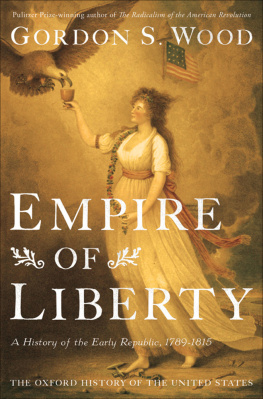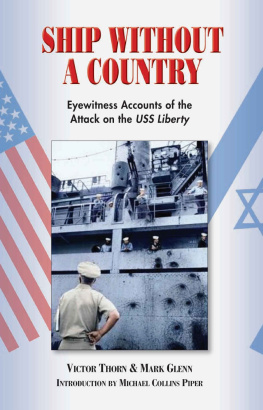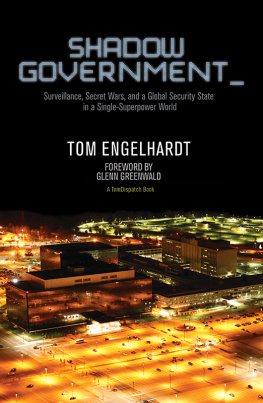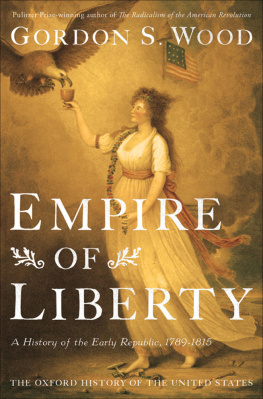
Rogue State
A Guide to the
World's Only Superpower
William Blum
Zed Books - London
Spearhead - South Africa
Rogue State: A Guide to the World's Only Superpower was first published in the United Kingdom by Zed Books Ltd, 7 Cynthia Street, London Nl 9JF, UK.
First published in the United States by Common Courage Press, Box 702, Monroe, ME
04951 in 2000.
New updated edition, 2002
This edition published in South Africa by Spearhead, a division of New Africa Books, PO Box 23408, Claremont 7735.
Copyright William Blum, 2001, 2002
Cover design by Andrew Corbett, Cambridge
Printed and bound in the United Kingdom by Cox and Wyman, Reading The right of the author of this book has been asserted by him in accordance with the Copyright, Designs and Patents Act 1988.
A catalogue record for this book is available from the British Library.
ISBN 1 84277 220 1 hb
ISBN 184277 221 X pb
In South Africa
ISBN 0 86486 543 0 Pb
"Critics will call this a one-sided book. But it is an invaluable corrective to the establishment portrait of America as 'the world's greatest force for peace.' Even confirmed opponents of U.S. interventionism can find much in this important book that will both educate and shock them."
Peter Dale Scott, former professor at U.C. Berkeley, poet, and author of Deep Politics and The Death of JFK
"Whatever we think we know about U.S. foreign policy, Rogue State makes it clear that we don't know nearly enough. This book's grisly content may seem to require a strong stomach, but reading its words is nothing compared to what has been doneand keeps being donewith our tax dollars and in our names. Whether we read Rogue State as a historical narrative or use it as a reference book, William Blum has put together a horrifying and infuriating piece of work. The footnoted information between these covers is enough to make any awake reader want to scream with rage. This is a truly subversive book because it demolishes the foundations of basic illusions about the United States of America as a world power."
Norman Solomon, author of The Habits of Highly Deceptive Media and winner of the George Orwell Award
Never before in modem history has a country dominated the earth so totally as the United States does today...America is now the Schwarzenegger of international politics: showing off muscles, obtrusive, intimidating...The Americans, in the absence of limits put to them by anybody or anything, act as if they own a kind of blank check in their
"McWorld."
Der Spiegel, Germany's leading news magazine, 1997
The United States is good.
We try to do our best everywhere.
Madeleine Albright, 1999
A world once divided into two armed camps now recognizes one sole and preeminent power, the United States of America. And they regard this with no dread. For the world trusts us with power, and the world is right. They trust us to be fair, and restrained. They trust us to be on the side of decency. They trust us to do what's right.
George Bush, 1992
How can they have the arrogance to dictate to us where we should go or which countries should be our friends? Gadhafi is my friend. He supported us when we were alone and when those who tried to prevent my visit here today were our enemies. They have no morals. We cannot accept that a state assumes the role of the world's policeman.
Nelson Mandela, 1997
When I came into office, I was determined that our country would go into the 21st century still the world's greatest farce for peace and freedom, for democracy and security and prosperity.
Bill Clinton, 1996
Throughout the world, on any given day, a man, woman or child is likely to be displaced, tortured, kitted or "disappeared", at the hands of governments or armed political groups.
More often than not, the United States shares the blame.
Amnesty International, 1996
Contents
Author's Foreword: Concerning September 11, 2001 viii
Introduction 1
Ours and Theirs: Washington's Love/Hate Relationship with Terrorists andHuman-Rights Violators
1. Why Do Terrorists Keep Picking on the United States? 29
2. America's Gift to the Worldthe Afghan Terrorist Alumni 33
3. Assassinations 38
4. Excerpts from US Army and CIA Training Manuals 43
5. Torture 49
6. The Unsavories 58
7. Training New Unsavories 61
8. War Criminals: Theirs and Ours 68
9. Haven for Terrorists 79
10. Supporting Pol Pot 87
United States Use of Weapons of Mass Destruction
11. Bombings 92
12. Depleted Uranium 96
13. Cluster Bombs 100
14. United States Use of Chemical and Biological Weapons Abroad 103
15. United States Use of Chemical and Biological Weapons at Home 113
16. Encouragement of the Use of CBW by Other Nations 120
A Rogue State versus the World
17. A Concise History of United States Global Interventions, 1945 to the Present 125
18. Perverting Elections 168
19. Trojan Horse: The National Endowment for Democracy 179
20. The US versus the World at the United Nations 184
21. Eavesdropping on the Planet 200
22. Kidnapping and Looting 210
23. How the CIA Sent Nelson Mandela to Prison for 28 Years 215
24. The CIA and Drugs: Just Say "Why Not?" 218
25. Being the World's Only Superpower Means Never Having to Say You're Sorry 227
26. The United States Invades, Bombs and Kills for It...but Do Americans Really Believe in Free Enterprise? 236
27. A Day in the Life of a Free Country 243
Notes 274
Index 305
About the Author 310
Author's Foreword: Concerning September 11, 2001 and the Bombingof Afghanistan
Shortly after the publication of this book, the momentous events of September 11, 2001
occurred. Four planes were hijacked in the United States and terrorists proceeded to carry out the most devastating attack on American soil in the history of the country. The physical destruction and personal suffering caused by the attacks was immense. In addition to punishing the perpetrators who were still alive, the most pressing mission facing the United States wasor should have beento not allow what happened to pass without deriving important lessons from it to prevent its recurrence. Clearly, the most meaningful of these lessons was the answer to the question "Why?"
It happens that the first chapter in this book is entitled "Why Do Terrorists Keep Picking on the United States?". It argues that terroristswhatever else they might bemight also be rational human beings, which is to say that in their own minds they have a rational justification for their actions. Most terrorists are people deeply concerned by what they see as social, political, or religious injustice and hypocrisy, and the immediate grounds for their terrorism is often retaliation for an action of the United States.
The chapter contains a lengthy list of such US actions in the Middle East, which have taken many lives, from the bombing of Lebanon and Libya to the sinking of an Iranian ship; from the shooting down of an Iranian passenger plane and the unending bombing of the Iraqi people to the support of despotic Middle Eastern regimes and the massive military aid to Israel despite the devastation and routine torture that the country inflicts upon the Palestinian people.
As retribution for decades of military, economic and political oppression imposed upon the Middle East and the mainly Muslim population who live there by the American Empire, the buildings targeted by the terrorists were not chosen at random. The Pentagon and World Trade Center represented the military and economic might of the United States, while the plane that crashed in Pennsylvania may well have been on its way to the political wing, the White House.
Next page

